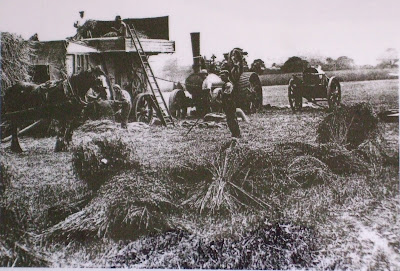The steam train is an iconic image of bygone Britain, but as
well as revolutionising overland transport, the steam engine revolutionised agriculture,
shipping, mining, and many other industries.
The first stationery steam engine was built by Thomas
Newcomen in 1712, and his engines were soon routinely used to pump water from
mines. Richard Trevithick pioneered the steam locomotive in 1801, which was
again first used by mine-owners, to haul laden wagons. Locomotives were adapted
for passenger use from the 1830s.
The railways provided a fast and reliable alternative to
Britain's often notorious roads (see Day 13). The country grew smaller and the
divide between distant communities lessened. People travelled to the
countryside for recreation; rural people moved to the towns to find work.
Manufactured goods and food – cheaply produced thanks to the Industrial
Revolution – could reach all areas of the Britain. The rural craftsmen such as
the blacksmiths, weavers and tailors found their livelihoods crumbling, never
to be restored.
Threshing corn, c.1930s.
In the agricultural world, steam engines were first utilised
to thresh grain from the ears of corn, once one of the most arduous tasks of
the farming year (see Day 70). Threshing engines were affordable only on the
largest farms, but portable engines were commonly touring farms by the 1830s.
Then followed steam-ploughs: two engines at opposite ends of
a field hauled a plough to and fro. Heavy, stony ground beyond the capabilities
of horses was soon under cultivation. Engines to grind beans and oats and chop
turnips for animal feed also became widespread.
Cheap grain from the corn-growing expanses of the USA and
Canada began to flood across the Atlantic thanks to steam ships. This signalled
disaster for the UK farmers. Thousands lost their farms in the 1870s, unable to
compete with the plummeting market prices.
Then in the 1850s, the internal combustion
engine was developed. Cars, tractors and diesel locomotives soon appeared. The
bitter-sweet dominance of the steam engine was over.


No comments:
Post a Comment